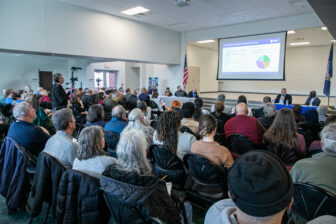Leaders say legislation will expand job growth and economic development while reducing costly air and climate pollution
ANNAPOLIS—Maryland lawmakers would help spur good-paying jobs and economic development by passing legislation in 2015 to expand the state’s use of clean, renewable energy, said business leaders and workers who came to Annapolis today to testify before a key House committee.
During a morning press conference with the bill’s lead sponsors, renewable energy entrepreneurs—including a former Army Major General—emphasized that a region-leading clean electricity goal would establish Maryland as a regional hub for investment in the fast-growing solar and wind industries.
“This legislation will lock in Maryland as a leader in the clean technology sector, expanding jobs and prosperity while diversifying our economy,” said Senator Brian Feldman, lead Senate sponsor of the Maryland Clean Energy Advancement Act (HB 377/SB 373).
“This is a clear instance where cleaning up our air and water means putting people to work,” said Delegate Bill Frick, lead House sponsor of the bill. “Maryland’s solar industry now employs 3,000 workers, growing by 29 percent in 2014. In 2015, it’s time to speed up this growth by expanding our state policy.”
The legislation, which has a hearing in the House Economic Matters Committee this afternoon, would gradually raise Maryland’s existing “Renewable Portfolio Standard,” which requires that an increasing amount of the state’s electricity comes from clean sources like wind and solar power. The bill would require that 25 percent of Maryland’s electricity come from clean sources by 2020 and set a trajectory to reach 40 percent by 2025, doubling the current standard.
Among the press conference speakers was Roger Blunt, a founder and chairman of Essex Construction who is also a retired U.S. Army Major General, a former director of Pepco, and a former director of the Maryland Chamber of Commerce. Essex is a Prince George’s County-based business that specializes in clean energy building projects.
“For the good of our economy, and for the good of our veterans, we need to pass the Maryland Clean Energy Advancement Act,” said Blunt. “By raising our renewable energy standard, we’ll send a strong market signal that Maryland is the place for solar and wind manufacturers to set up shop. We’ll also expand a growing clean energy workforce that employs a high percentage of veterans like me.”
Maryland is already first in the Mid-Atlantic region for green jobs per capita. Analysis shows that doubling Maryland’s use of renewable energy would create nearly 1,600 new jobs per year in the solar industry, which are well-paid and diverse. The policy could create 18,000 new jobs across the regional wind power supply chain, providing an economic lifeline to Maryland’s windy Eastern Shore and reinvigorating the state’s manufacturing base.
Executives of Baltimore-based BITHENERGY, Inc., a firm that has developed, financed, and integrated over 33 megawatts of solar projects, underscored that state policy is key to attracting businesses like theirs to Maryland.
“When we started BITHENERGY a few years ago, we had the option of starting the company in any number of states,” said Robert L. Wallace, president and CEO of BITHENERGY. “We chose the State of Maryland because of its commitment to expanding clean energy technologies and creating an economic environment that made it attractive to companies like BITHENERGY. The passage of HB 377 would significantly enhance the economic imperatives that are necessary for clean energy companies like BITHENERGY to thrive and to accelerate job formation.”
“E2 has tracked more than a quarter-million clean energy jobs nationwide the past three years, and what we’ve seen is this: states with the strongest clean energy policies get the jobs,” said Bob Keefe, executive director of Environmental Entrepreneurs, a national nonpartisan business group. “If Maryland wants more clean energy jobs, it should increase the renewables standard.”
Sustainable Energy Advantage, LLC (SEA), an independent renewable energy consulting and advisory firm, found that the ratepayer impact of increasing Maryland’s Renewable Portfolio Standard (RPS) to 40% by 2025 will likely be just under $2 per month per residential ratepayer (in 2014 dollars) in 2025. The ratepayer impact of increasing Maryland’s RPS to 25% by 2020 will likely be $0.52 per month per residential ratepayer (in 2014 dollars) in 2020.
In addition to delivering significant economic benefits, the Clean Energy Advancement Act would reduce the costly impacts of relying on fossil fuels—coal, oil, and gas—for energy, including dangerous air pollution, contaminated water and damaging weather. More than 85 percent of Marylanders live in areas that fail to meet the nation’s clean air standards. Increasing the state’s clean electricity standard is the top way the state can reduce the planet-heating emissions raising sea levels and fueling strange and severe weather in Maryland.
View the executive summary (PDF) of the Sustainable Energy Advantage, LLC ratepayer impact analysis.
NOTE TO JOURNALISTS:
Friday’s press conference kicked off a series of events demonstrating broad support for the bill among Maryland businesses, faith communities, public health advocates, labor leaders, social justice and environmental groups. Advocates are using the hashtag #CleanerMDnow to distribute information about the legislation and these supporting events:
On Monday, February 23rd from 7 p.m. to 8 p.m., hundreds of citizens will join legislators, faith, labor, and health leaders for a rally on Lawyers’ Mall to pass the Clean Energy Advancement Act, capping off the Maryland Climate Coalition’s citizen lobby night on the bill.
On Tuesday, February 24th at noon, ahead of a Senate Finance Committee hearing, two Maryland bishops will join other faith leaders for a tele-press conference, unveiling a letter signed by over 200 clergy of all faith traditions who are calling on legislators to expand clean energy. Journalists can join the tele-conference by dialing (605) 477-2100 and using passcode 306196#.
Contact:
Kelly Trout, 240-396-2022, kelly@chesapeakeclimate.org
Jeff Benzak, 202-513-6248, jeff@e2.org
###





